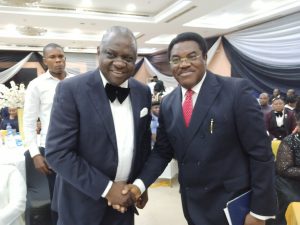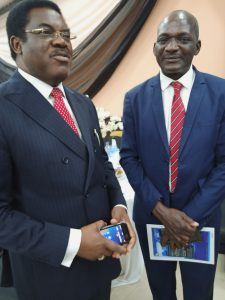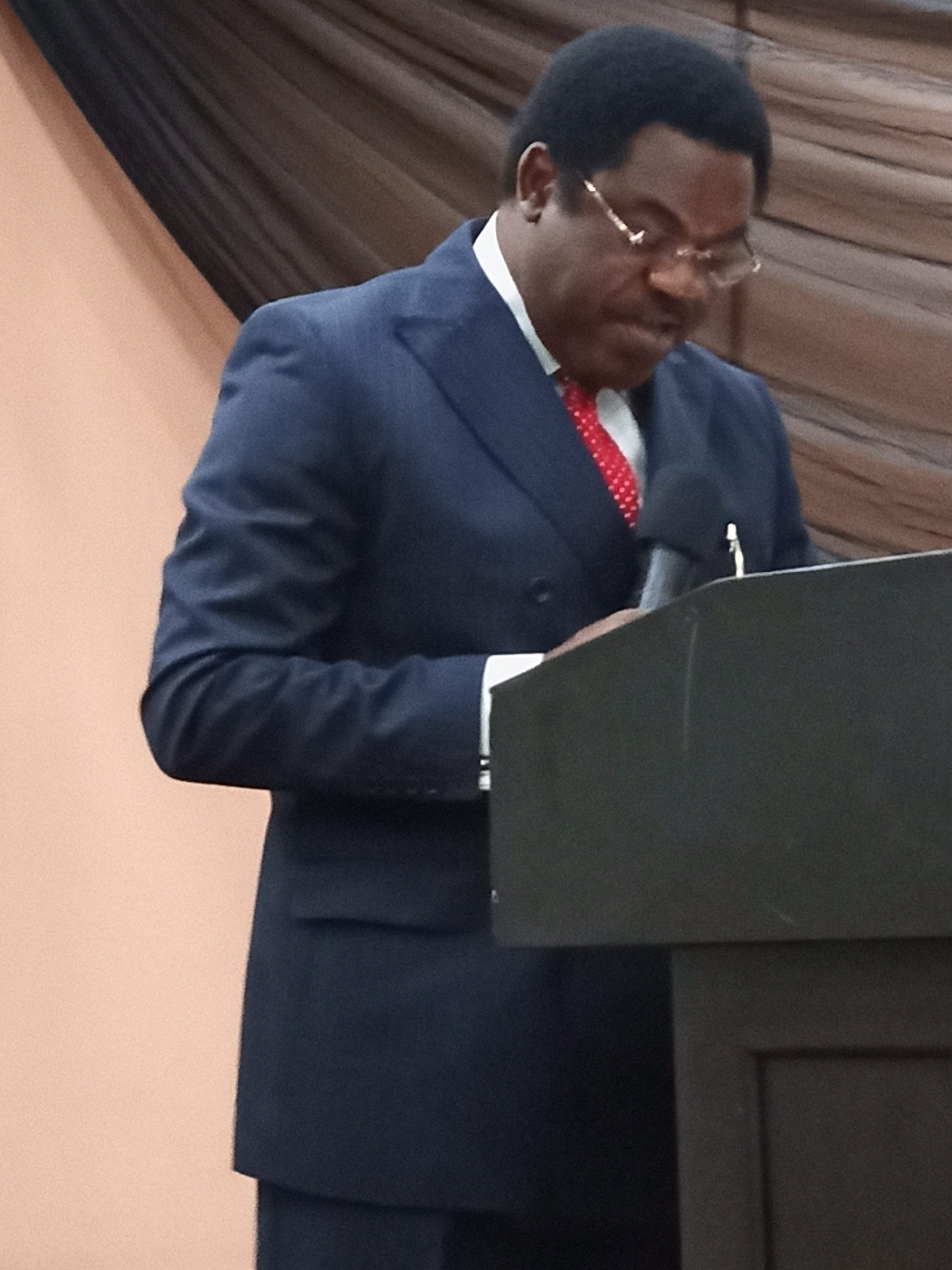I consider it a great honour and privilege to be invited to this Law Week Programme and particularly to give this dinner speech on a topic that is so dear to my heart. My profound thanks to the Branch Chairman, Dr. Paul Ebiala, a Bar man per excellence. My profound thanks also go to the Chairman of the Law Week Planning Committee, the immediate Past Attorney-General and Commissioner for Justice Cross-River State. Your acceptance to serve in this capacity notwithstanding the high level and status you have attained in this Profession epitomises your desire to serve the Profession and it is my hope that many, both from within and beyond this Branch, will learn from this that the greatest thing you can do to immortalise your name, the greatest legacy you can leave for humanity is SERVICE. I must also extend my appreciation to members of the Executive, the Leaders and members of this great Branch of our beloved Association.
I have been asked to speak briefly on the topic “Rule of Law: A Panacea for Good Governance.” I recognise that the theme of the Law Week is “Good Governance: Utilities, Social Services and the Law in Nigeria.” You also have sub-themes such as “Right to Light, Right to Water, Right to Shelter and Right to Clean Environment.” I want to believe that you have been treated to a great dose of good diet on these various topics. Permit me to say that, things like right to light, water, shelter and clean environment by now ought to be taken for granted after sixty (60) solid years of Independence. I wonder if these “rights” still constitute concerns even in Ghana, our neighbouring Country. That we are still battling with environmental issues; light, for lack of adequate power generation and distribution; clean water; and housing puts to question whether indeed we have had good governance in our Country over the years.
Life is a practical entity, only those who take a practical approach to life make the best out of it. The question is, “Are we taking a practical approach to the issues of life in our dear Country?” Somehow, it is my opinion that the role played by leadership or lack of it is by far the greatest obstacle to sustainable development as demonstrated by the ravaging poverty in our society. Mr. Gbenga Omotosho, a very erudite writer, said in an article titled “We are all Guilty” published in the Nation Newspaper in 2016 that: “Nigeria is a nation blessed by God, but cursed by the very hands that should nurture and nourish it.” A significant percentage of our problems as a Nation is caused by us. I believe our woes are self-inflicted.

Let me remind myself at this point that my discuss is the Rule of Law: a Panacea for Good Governance. Instructive in this topic is the meaning of Rule of Law and Good Governance.
RULE OF LAW
Recognising my audience, I am not going to bother you with a long definition of the Rule of Law because I strongly believe that we have a firm understanding of what Rule of Law means, its definition, contents, scope and even its application. Suffice it to say that “Rule of Law primarily means that everything must be done according to law. It means also that government should be conducted within the framework of recognised rules and principles which restrict discretionary powers, which Coke colourfully spoke of as ‘Golden and Straight Rule of Law’ as opposed to the uncertain and crooked cord of discretion.”
In the words of Honourable Justice Oputa J.S.C., “Rule of Law presupposes: (i) that the state is subject to the Law; (ii) that the Judiciary is a necessary agency of the Rule of Law; (iii) that Government should respect the right of individual citizens under the Rule of Law; (iv) that to the Judiciary is assigned both by the Rule of Law and by our Constitution the determination of all actions and proceedings relating to matters in disputes between persons, governments or authority.”
As far back as 1995, the International Commission of Jurists (I.C.J.) in calling attention to the apparent disregard of the Rule of Law in many Nations of the world, solemnly made the following declaration (which has become my darling statement) in the Act of Athens that:
- The State is subject to the Law;
- That Government should respect the right of individuals under the Rule of Law and provide effective means for their enforcement;
- That the Judges should be guided by the Rule of Law, protect and resist any encroachment by the Government or Political Parties on their independence as Judges;
- That Lawyers of the World should preserve the independence of their profession, assert the rights of the individual under the Rule of Law and insist that every accused is accorded fair trial.

GOOD GOVERNANCE
The word “governance”, I believe is derived from the word “government”. The Black’s Law Dictionary, defines “government” to mean “the structure of principles and rules determining how a State or organisation is regulated.” It also means “the sovereign power in a Country or State.” The Black’s Law Dictionary added that “government” also means “an organisation through which a body of people exercise political authority; the machinery by which sovereign power is expressed.” For instance, you talk of Canadian Government, American Government or Nigerian Government.
I could not find the definition of good governance in any dictionary but I found help from Google who took me to the United Nations Economic and Social Commission for Asia and the Pacific Report entitled “What is Good Governance.” It defined “good governance” to mean “that processes and institutions which produce results that meet the needs of society while making the best use of resources at their disposal. Good governance has eight (8) major characteristics. It is participatory, consensus, oriented, accountable, transparent, responsive, effective and efficient, equitable and inclusive, and follows the Rule of Law. It assures that corruption is minimized, the views of minorities are taken into account and that the voices of the most vulnerable in society are heard in decision-making. It is also responsive to the present and future needs of the society.”
On the other hand, Cambridge Online Dictionary defines “good governance” to be “the effective and responsible management of an organisation, a Country etc. which includes considering society’s needs in the decisions it makes.”
Good governance can also be defined as “the active and productive cooperation between the State and citizens, and the key to its success lies in the powers participating in political administration. Only when citizens have sufficient political power to participate in elections, policy making, administration and supervision can they prompt the State and join hands with it to build public authority and order. Apparently, democracy is the only practical mechanism that can safeguard the fully-free and equal political power owned by citizens. Hence, good governance is organically combined with democracy. In an autocratic system, it is possible to have good government when the system is at its best, but it is impossible to have good governance. Good governance can only be achieved in a free and political system, as it cannot emerge without freedom and democracy.”
From the above definitions, I submit that there is a close relationship between Rule of Law and Good Governance. Indeed, if there is no Rule of Law, you don’t talk of good governance. Both of them are in a symbiotic relationship.

Nigeria is a democracy with a written Constitution called the Constitution of the Federal Republic of Nigeria, 1999, as amended with provisions that are sacrosanct. The Constitution is the fountain of all laws. It is the composite document setting out how the Country is to be held together. In the case of Attorney-General of Ondo State v. Attorney-General of the Federation, the Supreme Court said: “Our Constitution is an organic instrument which confers powers and also creates rights and limitations. It is the supreme law in which certain first principles of fundamental nature are established. Once the powers, rights and limitations under the Constitution are identified as having been created, their existence cannot be disputed in a Court of Law. All agencies of government are organs of initiative whose powers are derived either directly from the Constitution or from laws enacted thereunder.”
Obedience to the provisions of the Constitution in all its ramifications is evidence of the Rule of Law in its application and a clear evidence of good governance. On the contrary, a threat to Rule of Law is not only a threat to the Constitution and good governance but also a threat to the society itself.
One of the wrong understandings that people have of our Constitutional Democracy is people think that good governance provides for construction of bridges, roads, houses and so on. While these are important, I submit that they are not dividends of Constitutional Democracy because any dictator can provide them. I hasten to recall that one of the greatest legacies of Military Dictatorship in Nigeria is the construction of the Third Mainland Bridge. For me, the dividends of democracy must be found in the defence and protection of Fundamental Rights of the people; the independence of Lawyers and Judges, free from harassment, intimidation or blackmail in the practice of their Profession; the formulation of strategic policies of governance in accordance with the Fundamental Objective and Directive Principles of State Policy as contained in Chapter Two of the Constitution. It would be recalled that this Chapter makes copious provisions for political objectives of government such as national integration and prohibition of discrimination on the grounds of place of origin, sex or religion. The Section also makes it obligatory for the State to foster a feeling of belonging and of involvement among the various people of Nigeria. Also, as part of the political objective of government, the State is to abolish all corrupt practices and abuse of power.
The economic objectives include but not limited to formulation of policies and programme to promote national prosperity and a self-reliant economy. This is in addition to the obligation to control the national economy and to secure the maximum welfare, freedom and happiness of the citizens.
The socio objectives, foreign policy objectives and environmental objectives are also clearly stated in the Constitution in order to ensure good governance. Chapter Four of the Constitution is also instructive in that it details out the proofs of good governance such as right to life, right to dignity of human persons, right to personal liberty, right to fair-hearing etc.
Regarding these rights, this is what the Court of Appeal said in the case of Akila v. The Director-General of State Security Service and Ors.:
“The Constitution of Nigeria is very clear, unambiguous, uncompromising and categorical about the rights of its citizens both those who are on the right side of the law and those who reasonably suspected of being on the wrong side of the law. When it comes to matters of curbing or curtailing a citizen’s rights, it does not leave us in any doubt as to what should be done or as to how we should proceed, nor does it leave matters to chance or to the discretion of individuals who may be inclined to subject such inalienable and immutable rights to abuse.
The civil rights contained in the Constitution against unjust arrest and detention of a citizen which is protected by the enforcement of the Fundamental Rights provisions should not be restricted in anyway by technicalities where none is justified by the Constitution.”
A dispassionate consideration of the realities of the moment vis-à-vis these very compelling provisions of the Constitution as interpreted by our Courts will throw-up issues as to whether Rule of Law and consequently good governance are not under threat and if the answer is Yes, then something has got to be done and urgently too.
WHAT IS THE COMPLIANCE STANDARD WITH THESE PROVISIONS TODAY?
Bishop Matthew Kuka once said that in Nigeria today there is no difference between “sin and the sinner”. Media trial and conviction of suspects standing trial has become the order of the day. Notwithstanding the admonition of our Courts or the Constitutional provision of presumption of innocence enshrined in Section 36 (5) of the Constitution of the Federal Republic of Nigeria, 1999, as amended.
Honourable Justice Akhiero, in a paper titled “The Impact of Media Trial on the Constitutional Presumption of Innocence” had this to say: “Anything that undermines public confidence in the judiciary is inimical to the judicial process the media should be wary of this. Trials by the media of criminal matters prejudice the mind of the populace and make them hold the Court in contempt and dishonour them when it ultimately reaches a conflicting or different verdict. More often than not, allegation of compromise and corruption are made against the Judge. This is very unhealthy for the development of our legal system and judicial process.”
Today, everybody, both learned and unlearned, educated and stack illiterates, freely discuss and render “legal opinions” on matters that are pending before the Court and when the decision of the Court goes contrary to the opinion expressed in the public space, to them the Judge has taken bribe. This again I submit is a threat to Rule of Law and good governance. Some of us Lawyers are no less guilty in the current low esteem of the nation’s judiciary and decimation of the integrity of the Legal Profession. I have heard Lawyers argue that our criminal jurisprudence should be changed from acquisitorial to inquisitorial procedure whereby a suspect shall be presumed guilty until he has proved his innocence. For me, these are clear cases of threat to the Rule of Law and good governance in our society.
Where Rule of Law operates, trials take place in the law Courts according to the Rules and laid down procedure. And when Orders and Judgments are handed down by the Courts, they must be obeyed subject of course to right of appeal as guaranteed by the Constitution. In particular, Rule of Law, good governance and principles of democracy demand that where the Supreme Court delivers its decision/ Judgment on any issue submitted to it, no matter the degree of dissatisfaction by the litigating parties or disagreement with the Judgment, we must accept the finality of the decision of the Supreme Court otherwise we shall be heading for chaos. It must be noted that the Supreme Court is not final because it is infallible, No! It is infallible because it is final. There must be an end to litigation.
Let me also consider the political angle to good governance. In its simplest form, Abraham Lincoln said that “Democracy means the government of the people, by the people and for the people.” I did not understand this eternal definition to mean the government of some people, by some people, and for some people as our system seems to show. A few days ago somebody in a write-up said that “Nigeria’s democracy is fast becoming the government of the politicians, by the politicians and for the politicians.” This position, if it is not true at all, I submit is arguable having regards to our daily democratic experience. Not subject to any argument, however is the definition propounded by Judge Bola Ajibola SAN, former President, Nigerian Bar Association, that “democracy is about people, and people are at the very centre of democracy. Therefore, for democracy to endure, it must necessarily guarantee the improvement of the lives of the people. Democracy and development are two sides of the same coin.” He continued: “For democracy to endure, it must guarantee the improvement of the lives of the people.”
Perhaps, this is the reason why good governance to some may mean the provision of good roads, regular supply of electricity, food on the table and security of lives and property. Even if these are to be regarded as evidence of good governance, we still have a long way to go. The enthronement of Rule of Law and good governance is a responsibility of both the government and the governed. The government must be ready and willing to take decisions no matter how hard, formulate policies and programmes that are of practical and positive advantage and benefit to the people. They must formulate and implement policies and programmes that will enhance the standard of living of the people. On the other hand, the people themselves must be civil, be law abiding and be ready to hold the government accountable from time to time.
Rule of Law is very key. It is not just a solution for good governance; it is also the basis for any true and functional Constitutional Democracy. Where the Rule of Law operates, there can be no room for impunity, little or no discretion, no room for dictatorship, arbitrariness, authoritarianism, abuse or misuse of power. The duty therefore is on all of us first as Lawyers and second as citizens to hold the government accountable for the defence, protection and promotion of the Rule of Law and good governance. If we fail to do this, we are to blame ourselves and not anyone else.
Let me take few seconds to talk briefly about Rule of Law and our Association. Please recognise that Rule of Law and due process does not apply to governments alone. It applies to organisations and individuals, particularly, organisations that have written constitutions. As Lawyers and members of Nigerian Bar Association, can we confidently say to ourselves that we are Rule of Law and due process compliant? It is arguable if we are.
Like the malaise in the national polity, you see desperation and outright impunity on the part of some of our members. For instance, the party some represent in a case decides how fast or slow they handle their matters in Court. To others honour, respect, dignity and honesty have little or no meaning. Can our Association be devilled with the same vices and still be able to correct the ills of the larger society? It is not what you want to be that matters but your purpose to be what you want to be. We must recognise that purpose does not target possession but contribution. Leadership is therefore not about status but about service. May I conclude by saying that the time has come when we have to accept responsibility to look directly into history and begin to ask: “What must we do differently to achieve a better result?”
I have always believed that the Nigerian Bar Association has the capacity to play the leadership role to reconstruct and transform our Nation, but we must first and foremost reconstruct and transform our Association. Only transformed people can transform their world.
Thank you for listening, God bless you.
Dele Adesina SAN
Dear readers, we really need your support to keep on serving you with authoritative, truthful, and juicy stories everyday. For your support, please reach out to the editor @gavelinternational66@gmail.com

